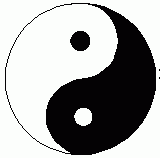 If there is nothing else that you can remember when you think about Feng Shui, please remember this: any Feng Shui method or formula that works that can be explained by the relationship of yin and yang.
If there is nothing else that you can remember when you think about Feng Shui, please remember this: any Feng Shui method or formula that works that can be explained by the relationship of yin and yang.
Yin and Yang are not opposites, but rather an expression of a relationship or relationships. If we say that noon is yang, we must be comparing it to something like the yin of midnight. Compared to the surface of the sun, noon would be yin, right? Compared to a tomb, midnight would be yang. In a house, humans are yang. In the great outdoors, the puny human is yin. Logical arguments can be made against any of these previous statements, again citing yin and yang. Yin and Yang do not exist in the abstract, or on their own. They only exist in relationship. They are not absolutes.
I recently read a post by Zoe Foo on the 13 Voices site which discussed the conflict Feng Shui practitioners can feel when confronted with the “proven science as irrefutable fact”, exoteric views of our society vs. the esoteric, philosophical and inspired nature of the theories that form the discipline called Feng Shui or Chinese Metaphysics. Her post is another great example of dealing with the yin and yang in every day life.
For a student or practitioner of Feng Shui, this root theory of yin/yang creates a need to understand and work in the realm of relativism, while staying grounded in common sense and science. Feng Shui, when applied properly, has to be a combination of science and intuition or inspiration. I think inspiration is probably a more accurate term. Applying Feng Shui principles effectively requires a drawing in or breathing in of the visible, or exoteric (i.e. the particular situation), resulting in a sudden insight via the esoteric, or unseen. For this reason, effectively applied Feng Shui can seem like magic or a miracle – even though magic and religion have nothing to do with it.
Some people get mired down in this relativism, worried that it applies to the morals and ethics of the profession as well. Why? Because some people feel freed by this relativism to act unethically and immorally toward their teachers, students, fellow students and clients.
The practitioners I want to emulate are the ones who have figured out how to live in this yin/yang existence, striving to recognize the relationships that are all around. They can live with the discomfort and the responsibility of having a foot in two worlds. These are the consultants who worry about the quality of their advice and its implementation, rather than how much money they can make, or how many followers they have. A consultant or teacher who respects the balance of the yin and yang cares what happens to you and wants it to be good. You help them to learn by providing the opportunity to see the results of their advice. Be careful and do your research before you choose a consultant.
If you are a student of Feng Shui, do your research before you choose a teacher. If you are serious about pursuing your studies of Chinese Metaphysics this choice will matter very much to you in years to come. Beware of those teachers whose great new formula breaks down when you try to apply the principles of yin and yang. Students must remember that anything they learn must work with the yin/yang principles or it is not Feng Shui.
